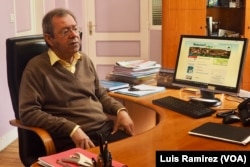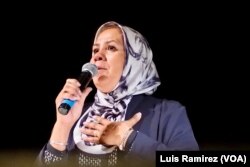An idyllic country manor set among the vineyards of the Loire River Valley, known for producing some of the world’s finest wines, is where France sought to pioneer its efforts to combat the radicalization of Muslim youth, but the experiment did not prove to be a success.
The efforts were late in coming, compared with other European nations. Britain launched its campaign shortly after the 2005 London attacks. Denmark has had largely successful programs in place for years.
France’s first efforts were in 2013, when it started an online campaign and a telephone hotline where relatives and teachers could report teenagers showing changes in behavior that pointed to radicalization.
Watch: A Year After France Attacks, De-radicalization Efforts Are a Trial and Error Exercise
France is late to the game
But it was the 2015 Islamic State group attacks, including one at the Bataclan theater where scores of people were gunned down, that prompted France to start an official, hands-on campaign that involved reaching out and dealing directly with radicalized youth by removing them from their environments and de-programming them.
The efforts drew further public support in 2016 when a shocked nation searched for solutions after attacks in Nice and Normandy.
“It was quite a sense of both denial and panic at the same time,” Muriel Domenach, general secretary of the French government’s Inter-ministerial Committee for the Prevention of Delinquency and Radicalization, told VOA. “Some people would say there’s no such thing as radicalization. It’s just a matter of lack of equal opportunities, social economic challenges. Others would say it has all to do with Islam,” she added.
The government’s plan was to open reintegration centers where young Muslims at risk were to come, sing the French national anthem and be immersed in the secular principles that underpin the French republic.
The first was at the Pontourney manor, near Beaumont-en-Véron. In principle, the town welcomed the idea, but only initially.
“Most people were of a spirit to say, ‘Why not, let’s try to do something,’ said Bernard Chateau, the mayor of Beaumont-en-Véron. “Today, we see that it did not work. It was a failure.”
Poor attendance and neighbors were scared
Attendance was voluntary, and only a handful of young Muslims came. Those who did frightened the neighbors. Some residents formed an association to protest.
“The association is not against dealing with de-radicalization but simply one has judged that in this location that is Beaumont-en-Véron in the middle of an inhabited place is not the place for de-radicalization,” said Catherine Bideau,” an association spokeswoman whose home looks across a field to the Pontourney manor.
“One had a Fiche S,” meaning the person had been flagged by French authorities as a threat to national security. “We had a person with psychiatric problems. We had a person who belonged to one of the most dangerous jihadist groups in France, the Strasbourg network, and links to one of the Bataclan attackers. So we had figures who really raised the question about a danger that was evident,” Bideau said.
The neighbors’ concerns point to underlying social attitudes in France that make de-radicalization a difficult subject to raise in a once Catholic nation where secularism, since the French Revolution, has been sacred.
“The problem arises as to why France reacted so belatedly, institutionally speaking, towards jihadism in comparison to other societies, other European countries,” said Farhad Khosrokhavar, a sociologist at the School for Advanced Studies in the Social Sciences in Paris. “One of the major obstacles was laicité, the ideology that the state, the government should not interfere with religion which is a private matter,” Farhad said.
France now looking at younger Muslims
Government officials call de-radicalization a process of trial and error, and are now examining ways to reach marginalized Muslims at a younger age, an approach supported by peace activist Latifa Ibn Ziaten, who was originally from Morocco. Ibn Ziaten’s son, a French paratrooper, was killed in a 2012 terrorist attack. She now lectures school groups.
“One must look at that youth as the future of France. That is important. And that is what is lacking much because today a young person should be followed from nursery school to middle school,” Ibn Ziaten said after a lecture in the Paris suburb of St-Denis. “What is happening is the opposite. We are focusing on the middle school youngsters and by then it is a bit too late,” she said.
Analysts say Muslims make up 7.5 percent of France’s population, the highest, percentage in Western Europe. With more than 1,700 French nationals joining the Islamic State group, the country is one of the highest contributors of recruits to the terror group.
According to the government’s initial plan, centers like Pontourney were to be set up in every region of France, but that will not happen. At the end of July, officials said Pontourney is closing.
Now, the government under new president Emmanuel Macron seeks to draw from the lessons of failure and search for a new way while upholding France’s values of openness, diversity and secularism.
“We will have to sort of rethink the whole process and see if this third way between what we call the open background and individual follow-up and prison should be further developed and how,” Domenach said. “This was one of the lessons learned from our previous experiments that disengagement is actually proving very difficult.”









